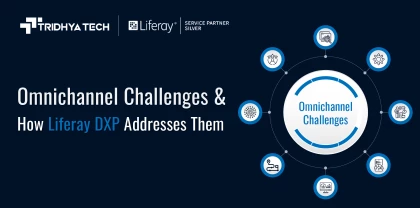Liferay
Liferay DXP or CMS- What is Preferable for Your Business?
We witness continuous changes in the business scenario, technology domain, and customer expectations. It is, therefore, necessary to transform your enterprise digitally and address the user’s requirements effectively. You can offer the omnichannel digital experience to your across various channels by taking assistance from the document management company.
Why Unified Experience is necessary?
Today’s tech-savvy customers expect unified and engaging experiences across all the devices. If you want to keep your company ahead of the curve in the growing competition, you need to put your customers first and provide them unified experience. What’s more, employees and stakeholders also like unified digital experience in all the processes with the help of a centralized document management system.
Technological advancements assist enterprises to transform internal operations into an excellent digital experience to the customers. Simply put, this transformation is based on delivering the right piece of content to the right audience in a unified way. Let’s compare the Content Management System (CMS) and Digital Experience Platform (DXP) to understand which one is in a better position to help modern enterprises meet the customer’s expectations and needs.
But before comparing them, let’s have brief information about both CMS and DXP.
What is CMS?
As a centralized system, the CMS assists companies to organize the content. It can be used for building the backend of the corporate website. Users or visitors can view the content with the help of CMS. A robust CMS can enable you to publish, manage, and control all types of content across both web and mobile channels. WordPress, Drupal, and Joomla are popular content management systems worldwide.
What is DXP?
The content management company also offers a digital experience platform to enable SMEs and large companies to deliver engaging experiences to the customers. The DXP is also a centralized platform and it can handle multiple integrations at once. Mostly, DXPs have built-in CMS capabilities. Some of the renowned digital experience platforms are Liferay DXP and Sitecore.
Major Difference between DXP and CMS
When it comes to providing in-depth customer experiences, DXP knows no competition! Do you want to know the key differences between CMS and DXP? Though there is a little overlap between these two from the functionality perspective, here we will attempt to differentiate DXP and CMS.
A DXP can better take care of the asset and content management at a large scale. It is possible to sync, manage, and publish the content across different platforms with the help of DXP. Be it a mobile platform or web portal and IoT devices, the DXP helps the users to publish content anywhere.
A reliable document management company can develop robust DXP solutions and multiple microsites to help eCommerce companies launch their projects. There, traditional CMS falls short of providing the best results. It is fair to mention that DXP has an upper hand over CMS for delivering digital experiences across various channels or platforms. Also, DXP can provide unified experience across all the devices.
DXP or CMS- What should be your choice?
CMS is fine for your enterprise if you do not consider digital platforms for distributing content. But, if you are looking for rich and personalized experience together with uniformity, then you need an advanced and sophisticated solution. There, the DXP steps in. It is indeed one step ahead of a CMS. Here the questions arise- why does your document management system need a DXP? Does your brand benefit from it?
The answer to these questions is- the DXP can help your enterprise offer an omnichannel customer experience. Let’s go through key benefits of DXP that help your brand to become successful online.
Strengthening Relationships
DXP can make your relationships stronger with existing and new customers. Both small and large enterprises can take benefits of DXP and develop productive relationships with the target audience throughout the lifecycle.
Offering omnichannel experiences
We have already discussed that DXP can provide an omnichannel experience. When your brand offers customers the same experience across multiple devices, you can certainly boost the sales and gain the customer’s trust.
Enabling integrations
The DXP can be readily integrated with existing and new data. You can easily optimize content and manage different document management systems through a centralized DXP while delivering engaging experiences.
Providing multiple touchpoints
The DXP enables you to address the customer’s requirements across various touchpoints. As a result, you can get a higher conversion rate.
The CMS offers limited access and scope for personalized customer experience. CMS is more useful for developing a user-friendly website as a whole rather than offering a personalized experience. It is not possible for CMS to get connected to various platforms and devices. These days, the IoT trend is on the rise and the CMS cannot enable you to make the most of connected devices.
Concluding Lines
In a nutshell, if you want your enterprise to remain competitive amid increasing challenges, it is better to choose a DXP. You can provide personalized content with a connected digital experience to your customers. A renowned content management company can help you find ways to get the most suitable DXP solution for your diverse business requirements.
Get the best content management services at competitive rates
Contact UsRelated Blogs
Recent Blogs
-
Future of Mobile Apps in the Car Rental Industry – 2025 and Beyond

-
Why Your Business Needs a Collaboration portal in 2025

-
MuleSoft in Healthcare: Transforming the Patient Management Experience

-
E-Commerce Integrations You Cannot Miss in 2024-25

-
Decode Supplier Management Success with Advanced Vendor Portals






















